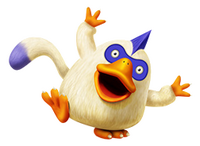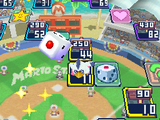Platypunk
| Platypunk | |
|---|---|
 Artwork of Platypunk from Fortune Street | |
| Species | Platypunk |
| First appearance | Dragon Quest IV: Chapters of the Chosen (1990, Dragon Quest series) Itadaki Street DS (2007, Super Mario-related media) |
| Latest appearance | Fortune Street (2011, Super Mario-related media) Dragon Quest Tact (2020, Dragon Quest series) |
- “This store belongs to the Family now. And that's the way it's gonna stay, capisce?”
- —Platypunk, Fortune Street
Platypunk is a monster species that appears as a playable character in Itadaki Street DS and its sequel Fortune Street, like Slime. Debuting in Dragon Quest IV: Chapters of the Chosen, Platypunk is a commonly seen enemy in the Dragon Quest series; serving also as the Slime's archenemy species. They mainly appear in Dragon Quest Monsters and Dragon Quest Heroes: Rocket Slime.
History[edit]
Itadaki Street DS[edit]
A Platypunk appears as one of eleven playable Dragon Quest series playable characters in the Super Mario and Dragon Quest cross-over game Itadaki Street DS.
Platypunk Cap, Platypunk Suit and Platypunk's Tail are collectible items that can be equipped on customizable characters.
Fortune Street[edit]
Platypunk returns as a playable character in the sequel Fortune Street for the Wii. His design remains almost unchanged from his initial appearance in Itadaki Street DS. He is C Rank in both games.
Profiles[edit]
Fortune Street[edit]
- Website description:
- English (American):
A duck-billed, dough-collecting beast. His rebellious hairstyle and villanous streak pretty much guarantee he's up to no good on Fortune Street.
- English (American):
Gallery[edit]
Artwork from Itadaki Street DS
Names in other languages[edit]
| Language | Name | Meaning | Notes |
|---|---|---|---|
| Japanese | ももんじゃ[?] Momonja |
Possibly from「ももんじ屋」(momonjiya, an Edo-period vendor that mainly sells wild game, including monkeys) | |
| French | Ornithox[?] | From ornithorynque ("platypus") | |
| Italian | Ornitorink[?] | From ornitorinco ("platypus") | |
| Spanish | Punkitorrinco[?] | From punki ("punk") and ornitorrinco ("platypus") |

